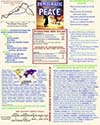[First published December 28, 2005] I just finished reading Downfall: The End Of The Imperial Japanese Empire by Richard B. Frank, which is on what led up to and caused the defeat of Japan in World War II. Based on the latest disclosures about the Magic and Ultra decoding of Japanese diplomatic and military messages and the debate among top Japanese rulers, this is the definitive book on the effect of our dropping the atomic bombs on Hiroshima and Nagasaki. It answers the major questions I had:
Were the bombs decisive? Yes. And it had to be two bombs. Hiroshima alone would have allowed the Japanese to conclude, which they were on the verge of doing, that we had only one bomb, and it would take a long time for us to make another.
Were the Japanese peace feelers in Moscow serious? No. Not by the Japanese or by the Soviets, who were bent on conquering Japanese held territory
Would a change in American surrender terms from unconditional surrender to allowing a continuation of the emperor and imperial dynasty have brought about surrender. No. The reason the Allies insisted on unconditional surrender was so as not to repeat the mistake of the Versailles Treaty that ended WWI. It allowed the Germans to keep their government and military organization in place, and left it to Germany to punish her war criminals, and reform the military that led her into war. Now, in WWII, Britain and the U.S. were convinced that Japan and Germany would have to be occupied, and democratized by the Allies. Few critics of our Afghanistan/ Iraq nation building seem aware that this is what we did successfully in “authoritarian and militaristic” Germany and Japan after their defeat.
Would a million Americans have been killed if we invaded Japan? Unknown. Contemporary estimates were 300,000 more or less would be killed. However, given that the Japanese had predicted where the invasion would take place, had reinforced her forces there well above what we anticipated, would use all her aircraft for suicide attacks, and had prepared civilian battalions for suicide attacks, the toll on our side may not only have been close to a million, but the invasion may have been defeated. In any case, the Navy finally opposed invasion, and preferred to rely on blockade and air attacks alone. However, the war ended before this became an open fight between the Army and Navy.
Were Hiroshima and Nagasaki democide? Yes, it was mass murder, as was the firebombing of Tokyo and all other major cities.
Therefore, should we not have dropped the bombs and carried out the firebombing? As an adamant opponent of democide, I must painfully conclude that with foresight as to the reasons below, I would have approved this democide:
It ended the war
It thereby saved the lives of millions of Japanese who were on the edge of starvation. They would have died of a nation-wide famine if we had started bombing the internal transportation network, and tightened the blockade, as planned had we not dropped the bombs. These are sure deaths aside from those who would have been killed had the Navy agreed to go along with an invasion.
It saved the lives of the millions who would have been killed under Japanese occupation and by continuation of the fighting in China, the Pacific, and Southeast Asia. Perhaps a million or more were saved by the A-bombs.
Had we invaded Japan, all POWs held by the Japanese would have been killed. That was a standing order.
At the time of the surrender, Soviet forces were on the verge of invading the home islands from the north, and had the war continued for months (the bombs were dropped on August 6 and 9, 1945. Our invasion of southern Japan was planned for November, and that of the Tokyo area in March 1946. By then, the Soviets might have taken and occupied half of northern Japan. Thus, once Japan was defeated, the Soviets would have shared in the occupation as they did in Germany. Many Japanese lives alone were saved from communist terror as a result, or from fighting invasion Soviet forces.
Even if the ruling military in Tokyo had been forced to surrender by an invasion or strangulation of Japan, her vast armies in China and elsewhere might have continued to do battle (deeply ingrained in the Japanese military by their culture and unique history was to never surrender — this was a matter of honor and self-esteem), and the attempt to occupy Japan would have met a nation-wide insurrection and terrorist attacks by civilians that would have made those in Iraq look puny. What brought about a total surrender of Japan’s people and armies was the Emperor overriding the military and making it an imperial decree to end the war forthwith, and his radio broadcast calling for all Japanese to surrender. He had to be obeyed. He did this because of the two atomic bombs.
So, for me, as for American decision makers at the time, there is the awful choice between two stark evils. One is to murder hundreds of thousands of Japanese civilians versus ending the war quickly with the millions of lives thus saved. What we have here is the need for — and even to think about it gives me a feeling of horror — a Just Democide Doctrine — that is an ethical rational for democide comparable to the Just War Doctrine developed by Catholic Theologians centuries ago. That is: If the lives to be assuredly saved by a democide far exceed in number the lives to be murdered, than the murdering is justified, although evil.
As to the ethics of this, I’ve been a deontologist, and much influenced by Immanuel Kant. Now, with this idea of a Just Democide, I’ve collapsed into situational ethics. So be it. That’s the world we live in.



 Posted by rudyrummel
Posted by rudyrummel 






